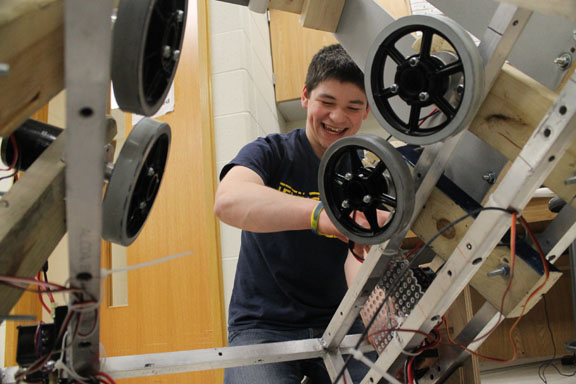
On March 6, the TechHOUNDs robotics team will begin its competition season (see sidebar). George Giltner, TechHOUNDs team administrator and Industrial Technology teacher, said TechHOUNDs is a valuable club because robotics could potentially change the world.
“In the medical field, I think robotics could help in a nursing home, where an elderly person needs help getting out of bed, getting dressed, feeding themselves or picking up something they dropped,” Giltner said. “If you’re thinking about manufacturing, robots are always going to be able to do much more precise types of cutting and assembly of parts.”
According to Giltner, there are many innovations in robotics that have already changed the world. He said, for example, the military uses drones to sniff out bombs or potential hazards in a room, and the manufacturing industry uses robots to mass-produce items.
However, new ideas like Amazon’s proposal to implement the use of drones to deliver packages could also have a lasting impact, Giltner said.
“Drones work off of batteries that might pollute the environment because of the chemicals in the batteries, but not like (how) a semi-truck pollutes the environment. It might be a different type of pollution, but it might be more energy-efficient to have rechargeable batteries flying things out,” Giltner said.
Sophomore Ashley Melcho, who said she frequently orders from Amazon, thinks Amazon’s drones will likely change the world by sparking a new interest in the ways the world works.
“The drones would probably change technology more than anything,” Melcho said. “I think the drones will be more effective than (Amazon’s) current system, because as long as there are no major problems, it will be much quicker than their current system. I would be more likely to use Amazon because of the speedy service.”
Despite the benefits of Amazon’s drones, Melcho said there are also potential consequences that come with their implementation, such as less human contact and a more technology-based world.
Giltner said he disagrees with this sentiment.
He said, “I know some people find (robotics) could be potentially dangerous because it might make people lazy because of the things it does, but it doesn’t have to be like that. If I had a robot at home to help my grandmother get up in the morning because I can’t be there, that would be an awesome tool to me and her. I don’t see that as anything lazy at all; I think that’s helping someone that needs help.”
Although there are benefits and consequences of using drones to deliver packages, Melcho said the benefits outweigh the consequences.
She said, “I think at first people might make a big deal about the drones, but I think people will get used to it. Amazon’s drones might be very useful if everything goes well.”

































![AI in films like "The Brutalist" is convenient, but shouldn’t take priority [opinion]](https://hilite.org/wp-content/uploads/2025/02/catherine-cover-1200x471.jpg)










































![Review: “The Immortal Soul Salvage Yard:” A criminally underrated poetry collection [MUSE]](https://hilite.org/wp-content/uploads/2025/03/71cju6TvqmL._AC_UF10001000_QL80_.jpg)
![Review: "Dog Man" is Unapologetically Chaotic [MUSE]](https://hilite.org/wp-content/uploads/2025/03/dogman-1200x700.jpg)
![Review: "Ne Zha 2": The WeChat family reunion I didn’t know I needed [MUSE]](https://hilite.org/wp-content/uploads/2025/03/unnamed-4.png)
![Review in Print: Maripaz Villar brings a delightfully unique style to the world of WEBTOON [MUSE]](https://hilite.org/wp-content/uploads/2023/12/maripazcover-1200x960.jpg)
![Review: “The Sword of Kaigen” is a masterpiece [MUSE]](https://hilite.org/wp-content/uploads/2023/11/Screenshot-2023-11-26-201051.png)
![Review: Gateron Oil Kings, great linear switches, okay price [MUSE]](https://hilite.org/wp-content/uploads/2023/11/Screenshot-2023-11-26-200553.png)
![Review: “A Haunting in Venice” is a significant improvement from other Agatha Christie adaptations [MUSE]](https://hilite.org/wp-content/uploads/2023/11/e7ee2938a6d422669771bce6d8088521.jpg)
![Review: A Thanksgiving story from elementary school, still just as interesting [MUSE]](https://hilite.org/wp-content/uploads/2023/11/Screenshot-2023-11-26-195514-987x1200.png)
![Review: "When I Fly Towards You", cute, uplifting youth drama [MUSE]](https://hilite.org/wp-content/uploads/2023/09/When-I-Fly-Towards-You-Chinese-drama.png)
![Postcards from Muse: Hawaii Travel Diary [MUSE]](https://hilite.org/wp-content/uploads/2023/09/My-project-1-1200x1200.jpg)
![Review: "Ladybug & Cat Noir: The Movie," departure from original show [MUSE]](https://hilite.org/wp-content/uploads/2023/09/Ladybug__Cat_Noir_-_The_Movie_poster.jpg)
![Review in Print: "Hidden Love" is the cute, uplifting drama everyone needs [MUSE]](https://hilite.org/wp-content/uploads/2023/09/hiddenlovecover-e1693597208225-1030x1200.png)
![Review in Print: "Heartstopper" is the heartwarming queer romance we all need [MUSE]](https://hilite.org/wp-content/uploads/2023/08/museheartstoppercover-1200x654.png)




